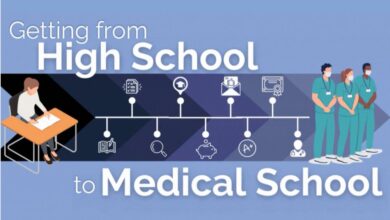Over the past few years, I’ve noticed a tendency for medical school applicants to downplay their sorority involvement when submitting their applications. It seems the stigma of Greek life has driven some people away from embracing that aspect of their college identity. In my opinion, if you sell an admissions committee short on yourself because you’re afraid of the stigma, then you’re missing out on including an important element of your background. As a Freshman, I was one of the founders of a rebooting social fraternity at UCLA and was very upfront about it in my medical school application. I was, of course, also actively involved in other academic and clinical experiences, but I didn’t shy away from highlighting my fraternity involvement or indulge in the fear that it may have seemed “out of place” to the admissions committee. I owned it, conveyed myself honestly, and it was well received. You do not have to choose between being a strong candidate for medical school and being in a sorority, they are not mutually exclusive. Wanting to go into medicine should not preclude you from going into Greek life, if anything it’s a valuable exercise in time management, fiscal responsibility, and balance that is better learned sooner rather than later. But if you’re absolutely scared of the stigma, you can look into pre-med sororities. Their sole mission aligns with becoming a physician and helping those in need. I also want to mention that I know the experience of Greek life differs based on the house and the campus, so if you don’t consider your sorority a place where you can grow and learn as a leader, then I suggest you think of ways to change that culture or spend your time with groups that you respect. Here are some points to consider when evaluating the advantages of Greek life in your application.
-
It Quantifies Your Social Capacity.
If you want a serious shot at getting into a top medical school these days, it’s not good enough to just be smart and accomplished. Almost every applicant is extremely well qualified, so what separates a genius with a 4.0 and a 525 on their MCAT from an applicant with a 3.7, and a 520 on their MCAT? It’s the content and character of their application. Traits such as balance, emotional maturity, compassion, empathy, sociability, and work experience really do add an important personal element for the admissions committee to consider. These personal factors can be one of several tipping points in your entire application, so don’t neglect them. You have to provide the admissions committee with compelling reasons to bring you to their school. Who would you rather have attended your school, the premed student who compulsively checks all the boxes and whose activities hours add up to more than there actually are in a week? Or the more balanced candidate who is smart, likable, and seems to be a social and academic asset to the incoming class? Being involved in Greek life is a tidy and clear way of showing an admissions committee that you have the social capacity and the ability to work well with others, and in the context of academic accomplishment, it can demonstrate that you are invested in social balance. Don’t underestimate the importance of these characteristics. You may not realize it yet, but medicine is a social field. You’re interacting with students, physicians, and most importantly, with patients and their families, which is why some medical schools seriously consider the ability of an applicant to manage human interactions as a criterion for admission. In fact, pre-med sororities emphasize the social aspect of medicine and gear you to become a very sociable physician.
-
Reject Your Own Stereotypes Of Greek Life.
It’s no shock that at times social functions can dominate Greek life, but within all the fun and games, don’t forget that you’re also being immersed in an experience that can provide countless unique learning opportunities. For example, handling budgets in excess of $200,000, booking venues, dealing with alumni and overseeing institutions, developing risk reduction policies, understanding different types of insurance policies, doing community service projects, and planning the logistics of large events are all part of Greek life. You also develop a lot of unique skills that are simply impossible to learn anywhere else in college. Where else in college do you own a house where you have to govern and make decisions within an outspoken group of up to 200 people? Greek life simply provides some unique and valuable learning experiences that you should not neglect when representing your experience and skill set.
-
If You Can Be A Leader In Your Sorority, You Can Lead Anything.
A lot of the functions of sororities occur on a grand scale, and although some of them can be very fun, a lot of them are just simply hard work. Coordinating so many people within one house is grand in itself. Planning philanthropies for hundreds of people is grand, and creating rules, structure, and repercussions for peer members is grand. If you can figure out a system for 45 paying and entitled live-in members to share a kitchen and refrigerator in peace, then when Margaret from accounting is complaining that someone is eating her yogurt from the employee lounge fridge a few years later, dealing with this trivial issue is almost second nature. In a sorority, you learn how to motivate people to clean, keep their grades up, manage communal items, and most importantly, create a community of respect, accountability, and growth. You learn to troubleshoot so many different daily situations in a sorority that you become an expert in dealing with these kinds of problems in the real world.
-
It’s A Community Of Information.
This is arguably one of the most valuable aspects of being in Greek life. The community here is a microcosm of what you will see for the rest of your life, and learning how to engage and utilize your early networks can really help you in ways you might not be able to anticipate. In a sorority, you have decades of experienced alumni to mentor you, and who love to give back to those who are following in their footsteps. A sorority is not only a social community for college but a community of professionals who help each other. Pre-med sororities offer an even greater sense of community because everyone is working towards the same goal to become a physician.
The takeaway: People think too hard about what admissions committees “want to see,” and too many times I’ve seen that soften a strong application because it lacks a cohesive statement of self. Don’t shy away from Greek life just because you’re premed. It’s something to embrace and it can provide an infinite amount of positive information about your experience and character that you cannot get anywhere else. An alternative is looking to see if you’re school has any pre-med sororities you can be a part of. That way admission committees won’t have any stigmas or preconceived notions. I’m not saying that if you want to pursue medicine you should join Greek life, I’m saying that you shouldn’t let misconceptions about Greek life get in the way of making your undergraduate identity your own. Be honest and proud of how you spent your time in college and represent it fully on your medical school application.
So whether you decide to join a regular or a pre-med sorority. The experiences and lessons you gain from it will help you become an amazing physician. When it comes time to apply for med school, you need to be able to articulate the experiences you’ve gained accurately. And that’s where MedSchoolCoach comes in.
MedSchoolCoach offers medical school application support, you’ll be matched with a renowned physician and writing advisor to ensure you have the best medical school application possible.
Get Application Advising Help


